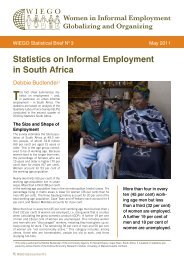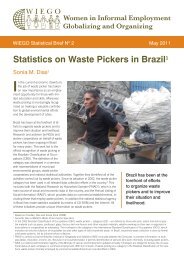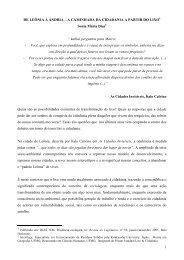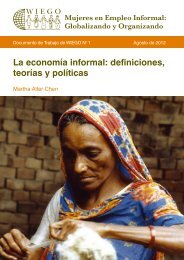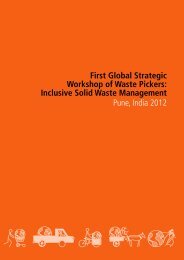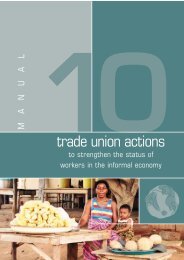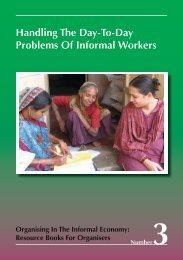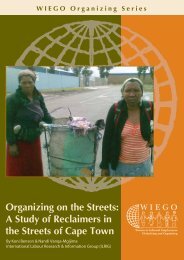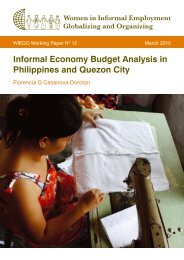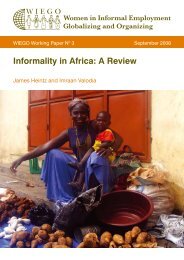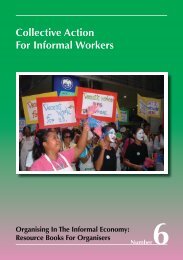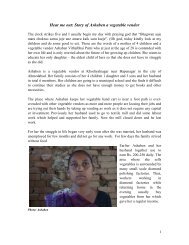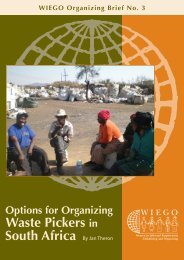Waste Pickers and Carbon Finance: Issues to Consider - WIEGO
Waste Pickers and Carbon Finance: Issues to Consider - WIEGO
Waste Pickers and Carbon Finance: Issues to Consider - WIEGO
- No tags were found...
You also want an ePaper? Increase the reach of your titles
YUMPU automatically turns print PDFs into web optimized ePapers that Google loves.
<strong>WIEGO</strong> Technical Brief (Urban Policies) N o 7Other Funding Options <strong>and</strong> SolutionsIn terms of how waste pickers <strong>and</strong> their MBOs would use money earned from carbon offset trading, a numberof priorities were presented. These include increasing personal incomes, but more generally there is aninterest in collective improvement of livelihoods, such as through opening a scrap shop in one case, <strong>and</strong>contributions <strong>to</strong> pensions <strong>and</strong> education. Other important considerations include a decent place <strong>to</strong> workwith occupational health <strong>and</strong> safety (OHS) fac<strong>to</strong>red in, <strong>to</strong>ilets, a kitchen, s<strong>to</strong>rage space, <strong>and</strong> vehicles. 10Given these straightforward priorities <strong>and</strong> needs, the question should be asked: are there other, simpler,less risky <strong>and</strong> more viable funding options in which the limited time <strong>and</strong> resources of MBOs should beinvested, before pursuing the development of a carbon offset project?As noted in an earlier study, one of the “co-benefits” of waste picker recycling systems is thedevelopment of: small enterprises <strong>and</strong> new products based on recycled materials. <strong>Waste</strong> pickersare highly skilled at identifying waste with potential value. Their prime economic incentiveis the income they can make by adding value <strong>to</strong> recyclable material. Informal recycling hascatalysed the growth of craftsmen, small-scale low-technology manufacturing <strong>and</strong> low-cost affordableproducts.Geohagen <strong>and</strong> Cooper (2009: 3)A key “takeaway” from this research was the emphasis that one waste picker interviewee placed on theneed <strong>to</strong> invest in innovation, <strong>and</strong> how this would be a better alternative <strong>to</strong> generate income than pursuingthe development of a carbon offset project. Investment in innovation could allow waste pickers <strong>to</strong> transform<strong>and</strong> add value <strong>to</strong> waste-derived raw materials. The same respondent also noted that he <strong>and</strong> his MBO didnot want <strong>to</strong> have <strong>to</strong> depend on anyone for funding. This is in keeping with the view of waste pickers asenvironmental or climate entrepreneurs. (Vryenhoek 2009: 1; Chintan 2009: 6)Even if investment for the sake of carbon offset trading is not commercially viable, there may be companieswilling <strong>to</strong> invest in the activities of waste picker MBOs because of the combined social <strong>and</strong> environmentalbenefits. One key informant explained how her MBO was exploring this type of CSR relationship with amanufacturer who approached them about recycling their snack packaging. As the same respondent noted,the requirements for developing a carbon offset project are very <strong>to</strong>ugh <strong>and</strong>, given the lack of resources<strong>to</strong> engage expert advice, MBOs would need venture capital or other large-scale funding, such as might begained from a partnership with government. At present MBOs simply have <strong>to</strong>o many other priorities, <strong>and</strong>would, for example, prefer <strong>to</strong> spend effort <strong>and</strong> resources on entering in<strong>to</strong> CSR relationships with specificbusinesses, rather than trying <strong>to</strong> develop a carbon offset project.According <strong>to</strong> another respondent, this type of CSR relationship would be acceptable, <strong>and</strong> better than tradingcarbon offsets, but it could put the MBO at risk of exploitation, as is already the case in waste pickers’relations with middlemen, <strong>and</strong> emphasis would be better placed on negotiating contracts with municipalauthorities for the collection <strong>and</strong> recycling of municipal solid waste, rather than being dependent on thecharity of a corporation.Besides investment in innovation, entering in<strong>to</strong> CSR arrangements with corporations or waste managementwith municipalities, funding from public <strong>and</strong> private climate-change sources may be simpler <strong>to</strong> access, <strong>and</strong>should be considered. As indicated in the “background document,” some are presented on the ClimateFunds Update website.Interestingly, when the challenges faced by waste pickers globally were discussed at the First GlobalStrategic Workshop of <strong>Waste</strong> <strong>Pickers</strong> in Pune in 2012, carbon finance was not cited as a potential solution.(<strong>WIEGO</strong> <strong>and</strong> Global Alliance of <strong>Waste</strong> <strong>Pickers</strong> 2012: 2)10Several other requirements <strong>and</strong> priorities are outlined in Achtell (2012), including items like computers, printers <strong>and</strong> other basic office equipment necessaryfor the management of an organization, <strong>and</strong> funding <strong>to</strong> cover operational or project costs <strong>and</strong> personnel <strong>to</strong> undertake management functions.8




